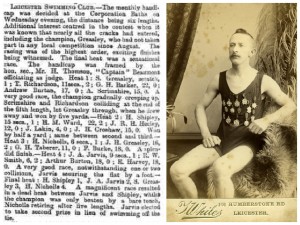 Flick through our family’s Victorian photo album and you’ll see plenty of stiff and starchy studio poses – ladies in their bonnets and shawls, gents with three piece suits and top hats. So it comes as a surprise to turn the page and find this fine fellow, clad only in a swimsuit and sporting a chest full of medals.
Flick through our family’s Victorian photo album and you’ll see plenty of stiff and starchy studio poses – ladies in their bonnets and shawls, gents with three piece suits and top hats. So it comes as a surprise to turn the page and find this fine fellow, clad only in a swimsuit and sporting a chest full of medals.
For years, it had been a mystery as to exactly who this swimmer was. The provenance of the photo album – and facial similarity to others in the Shipley family – suggested to me that he might be one of four Shipley brothers: Frederick, Harry, William or George. But if so, which one?
Winning those medals could have been a newsworthy event, I reckoned, so I turned to The British Newspaper Archive online in the hope of finding a trace. There are 14 medals pinned to his swimsuit, hopefully one might merit a mention in the local newspaper.
Until recently, searching newspapers used to be a needle-in-the-haystack experience; you needed a pretty clear idea of what event and date you were looking for, and then – with a bit of luck – you might find something after a long trawl through microfilm at the local archives or at the British Library’s (now closed) outpost at Colindale. It was an eye-straining, time-consuming process. These days, thanks for the BNA’s online access and ‘Advanced Search’ functionality, you can quickly track down family events from your home computer.
You might expect some events to be recorded, such as a marriage notice or an obituary, and yet others can come out of the blue. In the case of my swimmer, I searched for the names of each of the four Shipley brothers in turn. It soon became clear that Harry Shipley was an accomplished swimmer and water polo player. From 1887 to 1894 he pops up repeatedly at Leicester Swimming Club. From time to time there are references to his brothers – William and George – but it’s Harry who gets the main billing, with 10 articles mentioning his swimming races and water polo matches. This was the confirmation I needed to identify for sure the man in my photo.
One of Uncle Harry’s crowning achievements was reported in the Leicester Chronicle & Leicestershire Mercury on Saturday 21st February 1891:
“LEICESTER SWIMMING CLUB – The monthly handicap was decided at the Corporation Baths on Wednesday evening, the distance being six lengths. Additional interest centred on the contest when it was known that nearly all the cracks had entered, including the champion, Greasley, who had not taken part in any local competition since August. The racing was of the highest order, exciting finishes being witnessed. The final heat was a sensational race… Final heat: H Shipley 1, J A Jarvis 2, S Greasley 3, H Nicholls 4. A magnificent race resulted in a dead heat between Jarvis and Shipley, whilst the champion was only beaten by a bare touch, Nicholls retiring after five lengths. Jarvis elected to take second prize in lieu of swimming off the tie.”
Fantastic, Harry had added another medal to his collection. He would have been chuffed to win – John Arthur Jarvis, who he pipped to the post, was becoming a swimmer of national standing, who went on to win two gold medals in the 1900 Olympics.
As this episode demonstrates, local newspapers can provide a rich seam of material for family historians. It’s somewhat serendipitous as to what you’ll find; newspaper coverage won’t necessarily give you a rounded view of the family, but by unearthing a snippet or two – from school results and sporting achievements, to bankruptcies and street brawls – you can certainly add vibrancy, colour and fascinating detail to your history. Even if you don’t find personal references to your relatives, you’re still likely to discover interesting nuggets about their homes and workplaces.
Give it a go, who knows what you’ll discover? Before you sign up, it’s easy enough to try out a free search.
Click on the ‘Advance Search’ page, type an ancestor’s name in ‘the phrase’ box and Bob’s your uncle (or Harry is, in my case). The free search results are presented as brief extracts, tantalising teasers – to see the full articles you’ll then need to sign up, but at least the free search gives you some idea of what you might find.
I found it easiest to start with a one-month subscription – it doesn’t cost a great deal, about the same as a visit to the cinema and yet far more rivetting. And you could later decide to extend it to an annual subscription if you need ongoing access.
I often use newspaper clippings in my family storytelling, now that they are so easily accessible without endless hours of searching. As well as Uncle Harry’s swimming awards – of which more in future blog posts – I’ve found relatives winning gardening prizes, having fights in the street, advertising their businesses, and being hauled in front of the magistrate. These are all episodes that I would have missed in the days before online searching, unaware that they existed.
Try it out and let me know how you get on. I’m always interested to hear how newspaper clippings can be used as the basis for writing and illustrating family stories. Whether you find a small listing or a big scoop, you’ll find that newspapers can help enrich your research.